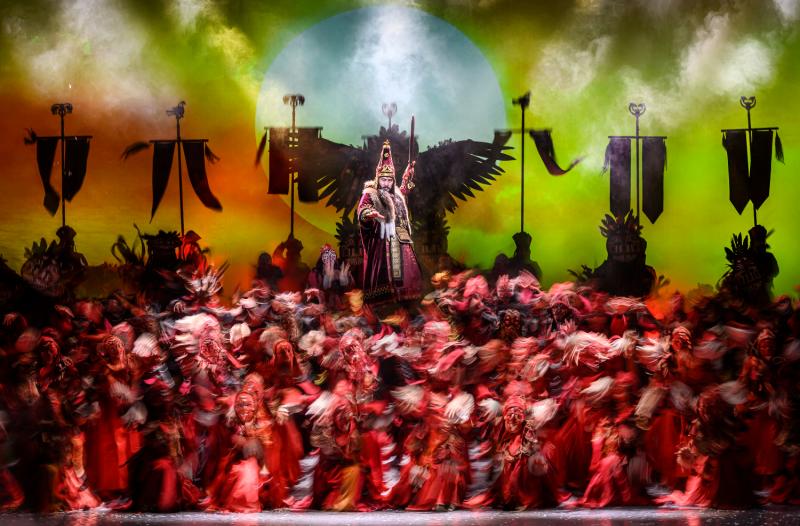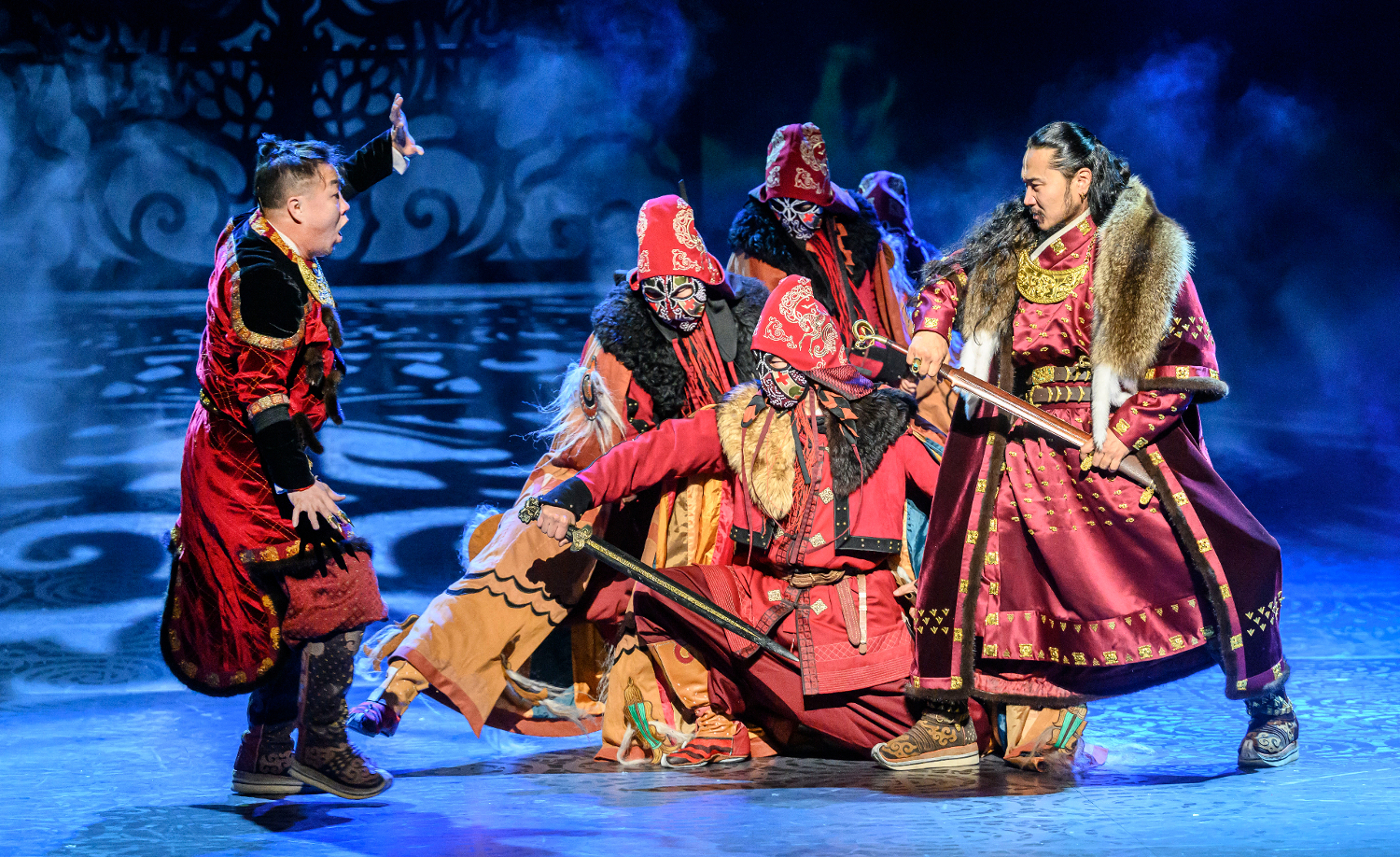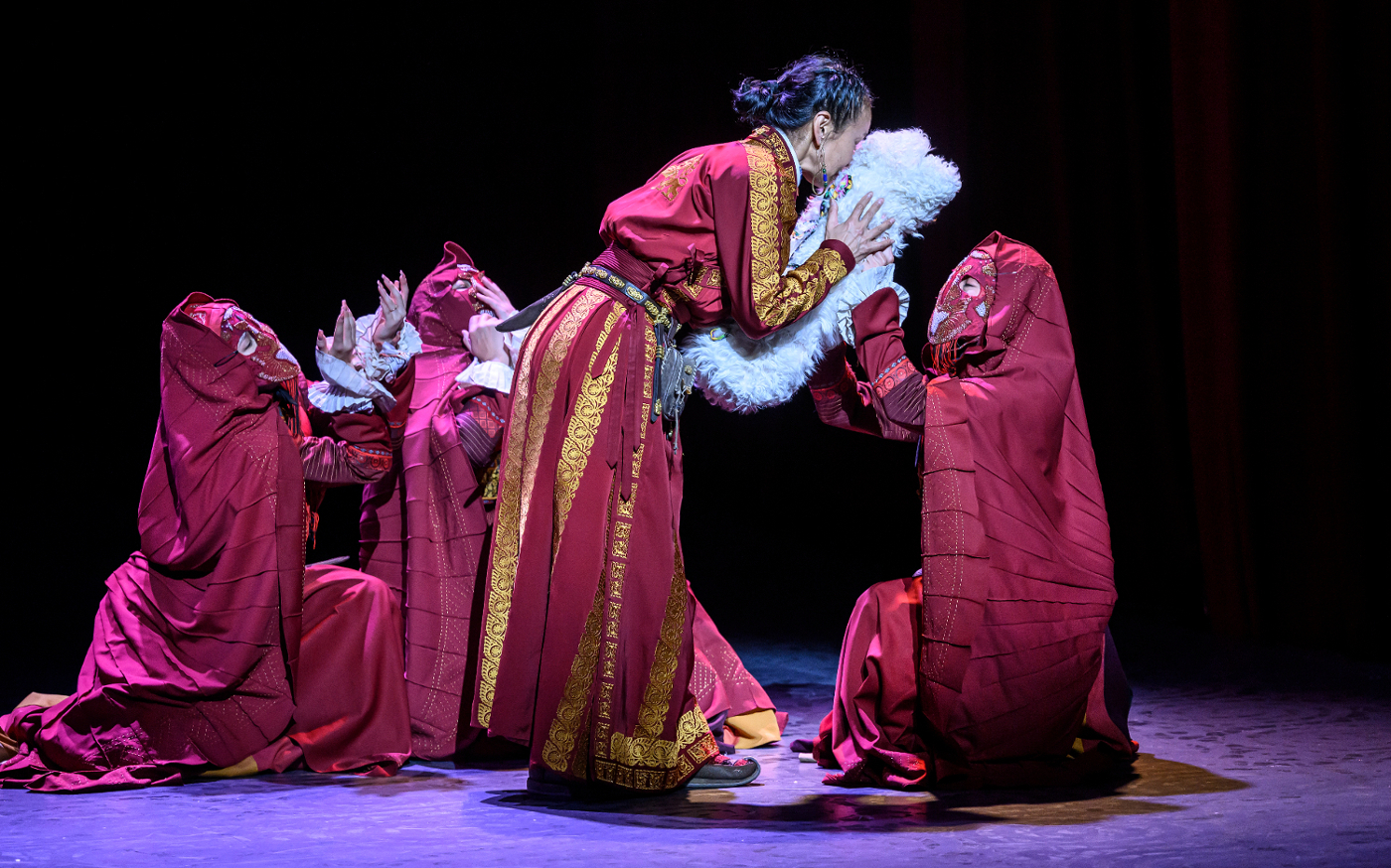The Mongol Khan, London Coliseum review - unique operatic spectacle utterly overwhelms flaws in pacing and story | reviews, news & interviews
The Mongol Khan, London Coliseum review - unique operatic spectacle utterly overwhelms flaws in pacing and story
The Mongol Khan, London Coliseum review - unique operatic spectacle utterly overwhelms flaws in pacing and story
Take its limitations on trust and this Mongolian epic proves the best value in town

“But that’s what they’re paying for!” replied my son as we, a little shellshocked by the previous three hours, skirted Trafalgar Square on the way home. I had reservations about some key components of the alchemy that produces great theatre, but none about the spectacle, even more impressive (as we subsequently agreed) than the big Cirque du Soleil extravaganzas that cost a helluva lot more for a seat in Vegas.
On its own terms, The Mongol Khan is a five-star show – and I’m already recommending it to friends. Not without reservations of course. As is the case for Grand Opera newbies, one must caveat enthusiasm with warnings about pacing and repetition, the length of an extended second half and a sensory overload that can overwhelm eyes and ears if one doesn’t take an occasional time out. All that said, what a ride it is! Based on Lkhagvasuran Bavuu’s 1998 play (as adapted by Olivier Award winner, Timberlake Wertenbaker), The Mongol Khan seeks to catch Mongolia's rich history, robust culture and specific polity as it charges by. Director Hero Baatar (magnificently photographed in the programme on a horse) references Chinggis Khan in his introduction, the most famous Mongol of them all, who founded the world’s largest contiguous empire and from whom, so it is said, many millions of humankind are descended today. You can catch plenty of Shakespeare, a little of Abraham and Isaac, and great swathes of Game of Thrones, if you prefer references closer to home.
Based on Lkhagvasuran Bavuu’s 1998 play (as adapted by Olivier Award winner, Timberlake Wertenbaker), The Mongol Khan seeks to catch Mongolia's rich history, robust culture and specific polity as it charges by. Director Hero Baatar (magnificently photographed in the programme on a horse) references Chinggis Khan in his introduction, the most famous Mongol of them all, who founded the world’s largest contiguous empire and from whom, so it is said, many millions of humankind are descended today. You can catch plenty of Shakespeare, a little of Abraham and Isaac, and great swathes of Game of Thrones, if you prefer references closer to home.
The story (but, as is often the case with opera, the story is far less important than it would be in a more orthodox play) concerns Archug Khan, the eponymous Khan, who is presented with two sons born days apart, one to his estranged wife and one to his beloved consort. The Queen’s secret lover, Egereg, Archug’s Chancellor, has something of Iago’s jealousy and Machivellian cunning, swapping the babes in their cots so his blood will ascend to the throne, while the hoodwinked Khan makes his own son merely a councillor. His plot comes undone when the false heir proves a psychopathic egomaniac and Archug sets in train a series of murders and sacrifices that even Hamlet might find both too ruthless and too tinged with regret. The acting is mannered, but works in this specific environment, the surtitles that translate the Mongolian language dialogue barely necessary. Erdenebileg Ganbold (pictured above with Dorjsuren Shadav) brings a powerful dignity to his idealistic Khan, his bearing majestic, but his private moments wrought with the agonies occasioned by doubt and dilemmas. As his nemesis, Bold-Erdene Sugar scoots about at his feet, a leering small-minded man with big ambitions, undone by his own hubris.
The acting is mannered, but works in this specific environment, the surtitles that translate the Mongolian language dialogue barely necessary. Erdenebileg Ganbold (pictured above with Dorjsuren Shadav) brings a powerful dignity to his idealistic Khan, his bearing majestic, but his private moments wrought with the agonies occasioned by doubt and dilemmas. As his nemesis, Bold-Erdene Sugar scoots about at his feet, a leering small-minded man with big ambitions, undone by his own hubris.
Dulguun Odhuku cannot do much with the relentlessly virtuous consort, though her acceptance of her fate is as heartrending to consider as it is astonishing to witness. Uranchimeg Urtnasan (pictured below) sensitively captures a Queen whose outrageous sensuality gives way to a mother’s love for a son she knows is not her own. There’s a super cameo too from Dorjsuren Shadav as Achir, the false heir, an evil pixie of a princeling who manages to extract a modicum of sympathy for his fate from an audience who knows that he has not chosen his destiny and needs love not condemnation from his father-not-father, who ruthlessly prioritises Empire over family.
So far, so good (if somewhat derivative). The show’s unique, mind-boggling appeal lies in its supremely confident staging, a spectacle the likes of which even this storied house can seldom have witnessed. A chorus of some 50 or more dancers, bedecked in an extraordinary wardrobe of costumes (by Bold Ochirjantsan) the colours, weight and movement of which conjure the Steppes in one’s mind’s eye, flooding the vast space with movement. Many act as the outward expression of the inner soul (think dæmons in Philip Pulman’s His Dark Materials), but, despite their often agonised writhing and violent intentions, they never lose the grace that suggests they’re lifted by the winds blowing over the vast cold plains of their homeland. Choreographer, Bayarbaatar Davaasuren, marshalls his troupe with pinpoint precision, but always in service of the narrative and, even more importantly, the mood that buoys it. You can see every penny of the ticket price on stage in every minute of this show – not something one can say too often these days.
A chorus of some 50 or more dancers, bedecked in an extraordinary wardrobe of costumes (by Bold Ochirjantsan) the colours, weight and movement of which conjure the Steppes in one’s mind’s eye, flooding the vast space with movement. Many act as the outward expression of the inner soul (think dæmons in Philip Pulman’s His Dark Materials), but, despite their often agonised writhing and violent intentions, they never lose the grace that suggests they’re lifted by the winds blowing over the vast cold plains of their homeland. Choreographer, Bayarbaatar Davaasuren, marshalls his troupe with pinpoint precision, but always in service of the narrative and, even more importantly, the mood that buoys it. You can see every penny of the ticket price on stage in every minute of this show – not something one can say too often these days.
Complementing the billowing wools, velvets and ermine, Andrew Ellis and Mike Robertson's lighting transforms the whole theatre into palaces, dungeons and even the internal workings of wracked minds. Back projection can be overdone, but it’s so often just right here, making The Time Traveller’s Wife and even Back To The Future look short on technical ambition.
What surprises most is the music. Composed by Birvaa Myaagmar and Odbayar Battogtokh, at first it feels amorphous and dissonant, but the percussion and strings works on the ear over time and, almost involuntarily, one becomes aware of the suggestion of horses galloping, battles commencing, dust driving through cold air.
There’s even a fire-breathing, god-like tiger that is so beautifully rendered that it surely has to come back – but no, just the two minutes in the spotlight for an unforgettable beast of a puppet.
It’s hard to imagine any theatre other than the Coliseum having the resources to stage this show (maybe the Royal Opera House or the Barbican, home again this autumn to My Neighbour Totoro, a different kind of spectacular production) so the limited 15 performances schedule makes sense – "mediaeval Mongolian opera sans singing" is not the easiest pitch after all. Though box office details should seldom be included in a review, the fact that tickets are available for under £30 must prove some of the best value in London right now.
Not an entirely irrelevant consideration in a cost of living crisis, when the lowest price seat advertised this side of Christmas for the London Palladium’s pantomime comes in at an eye-watering £75.
rating
Explore topics
Share this article
The future of Arts Journalism
You can stop theartsdesk.com closing!
We urgently need financing to survive. Our fundraising drive has thus far raised £49,000 but we need to reach £100,000 or we will be forced to close. Please contribute here: https://gofund.me/c3f6033d
And if you can forward this information to anyone who might assist, we’d be grateful.

Subscribe to theartsdesk.com
Thank you for continuing to read our work on theartsdesk.com. For unlimited access to every article in its entirety, including our archive of more than 15,000 pieces, we're asking for £5 per month or £40 per year. We feel it's a very good deal, and hope you do too.
To take a subscription now simply click here.
And if you're looking for that extra gift for a friend or family member, why not treat them to a theartsdesk.com gift subscription?
more Theatre
 Edinburgh Fringe 2025 reviews: Lost Lear / Consumed
Twists in the tail bring revelations in two fine shows at the Traverse Theatre
Edinburgh Fringe 2025 reviews: Lost Lear / Consumed
Twists in the tail bring revelations in two fine shows at the Traverse Theatre
 Make It Happen, Edinburgh International Festival 2025 review - tutting at naughtiness
James Graham's dazzling comedy-drama on the rise and fall of RBS fails to snarl
Make It Happen, Edinburgh International Festival 2025 review - tutting at naughtiness
James Graham's dazzling comedy-drama on the rise and fall of RBS fails to snarl
 Edinburgh Fringe 2025 reviews: I'm Ready To Talk Now / RIFT
An intimate one-to-one encounter and an examination of brotherly love at the Traverse Theatre
Edinburgh Fringe 2025 reviews: I'm Ready To Talk Now / RIFT
An intimate one-to-one encounter and an examination of brotherly love at the Traverse Theatre
 Top Hat, Chichester Festival Theatre review - top spectacle but book tails off
Glitz and glamour in revived dance show based on Fred and Ginger's movie
Top Hat, Chichester Festival Theatre review - top spectacle but book tails off
Glitz and glamour in revived dance show based on Fred and Ginger's movie
 Edinburgh Fringe 2025 reviews: Alright Sunshine / K Mak at the Planetarium / PAINKILLERS
Three early Fringe theatre shows offer blissed-out beats, identity questions and powerful drama
Edinburgh Fringe 2025 reviews: Alright Sunshine / K Mak at the Planetarium / PAINKILLERS
Three early Fringe theatre shows offer blissed-out beats, identity questions and powerful drama
 The Daughter of Time, Charing Cross Theatre review - unfocused version of novel that cleared Richard III
The writer did impressive research but shouldn't have fleshed out Josephine Tey’s story
The Daughter of Time, Charing Cross Theatre review - unfocused version of novel that cleared Richard III
The writer did impressive research but shouldn't have fleshed out Josephine Tey’s story
 Evita, London Palladium review - even more thrilling the second time round
Andrew Lloyd Webber's best musical gets a brave, biting makeover for the modern age
Evita, London Palladium review - even more thrilling the second time round
Andrew Lloyd Webber's best musical gets a brave, biting makeover for the modern age
 Maiden Voyage, Southwark Playhouse review - new musical runs aground
Pleasant tunes well sung and a good story, but not a good show
Maiden Voyage, Southwark Playhouse review - new musical runs aground
Pleasant tunes well sung and a good story, but not a good show
 The Winter's Tale, RSC, Stratford review - problem play proves problematic
Strong women have the last laugh, but the play's bizarre structure overwhelms everything
The Winter's Tale, RSC, Stratford review - problem play proves problematic
Strong women have the last laugh, but the play's bizarre structure overwhelms everything
 Brixton Calling, Southwark Playhouse review - life-affirming entertainment, both then and now
Nostalgic, but the message is bang up to date
Brixton Calling, Southwark Playhouse review - life-affirming entertainment, both then and now
Nostalgic, but the message is bang up to date
 Inter Alia, National Theatre review - dazzling performance, questionable writing
Suzie Miller’s follow up to her massive hit 'Prima Facie' stars Rosamund Pike
Inter Alia, National Theatre review - dazzling performance, questionable writing
Suzie Miller’s follow up to her massive hit 'Prima Facie' stars Rosamund Pike
 A Moon for the Misbegotten, Almeida Theatre review - Michael Shannon sears the night sky
Rebecca Frecknall shifts American gears to largely satisfying effect
A Moon for the Misbegotten, Almeida Theatre review - Michael Shannon sears the night sky
Rebecca Frecknall shifts American gears to largely satisfying effect

Add comment